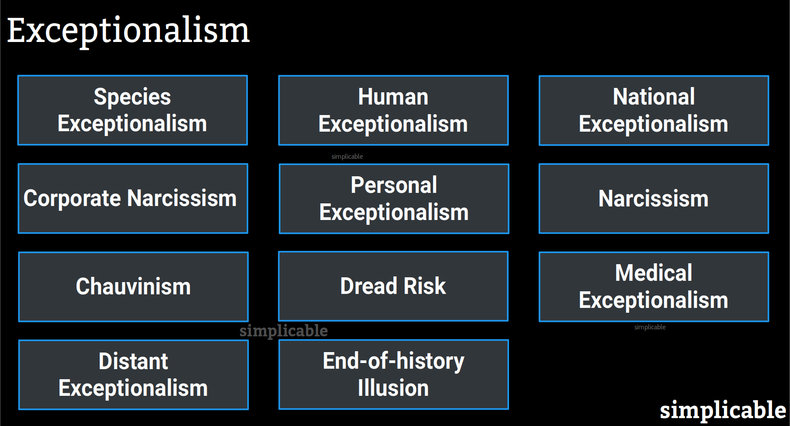

Species Exceptionalism
Highlighting one animal as being superior or more worthy of protection than other animals. For example, a cartoon that presents one species as being virtuous and another as villainous.Human Exceptionalism
Viewing humans as above nature as opposed to part of it. Clearly humans are an intelligent and advanced species that are extraordinary. However, it is common to take this too far to make incorrect assumptions. For example, it was historically common to assume that animals have no emotions when the modern scientific evidence is overwhelming that they do†.National Exceptionalism
National exceptionalism is the belief that a nation is extraordinary in some important way. National exceptionalism may cherry pick aspects of history or national character while downplaying commonality. In some cases, this exceptionalism is based on pure myth such as the persistent idea that Japan has one ethnicity when in fact Japan is a society with many ethnic and social minority groups and a population with heterogeneous origins††.Corporate Narcissism
Corporate narcissism is a tendency for large well-known firms or startups that are growing quickly to develop collective narcissism whereby members of the group have an inflated opinion of their ingroup. This can cause strategic errors and poor relationships with customers, partners, regulators and investors as a corporation views itself as brilliant and outsiders as relatively unintelligent.Personal Exceptionalism
The belief that oneself is fundamentally different from everyone else. For example, the belief that you are fundamentally stronger than everyone else such that you don't need any help. Personal exceptionalism can have both positive and negative effects. For example, it can be a source of confidence that creates talents over time if it isn't too far detached from reality.Narcissism
Narcissism can be viewed as a type of personal exceptionalism whereby an individual has a grandiose sense of self-importance and an excessive need for admiration. This can lead to a wide range of problematic behaviors such as surrounding yourself with sycophantic followers who provide you with a supply of flattery.Chauvinism
Chauvinism is excessive or prejudiced support for one's own ingroup or causes. For example, the belief that a particular cause that you happen to support is more important than all other problems the world may face at a particular point in time. The term chauvinism is also commonly used to describe partisanship and prejudice such as an attitude of superiority toward members of the opposite sex.Dread Risk
A dread risk is a risk that people intensely fear such that they try to minimize it. Over-focusing on a single risk is problematic because this tends to create large secondary risks. For example, a teenager who is completely focused on a risk of social rejection while ignoring risks related to education, safety and personal development. Entire societies and organizations demonstrate this behavior whereby they may seek to minimize a dread risk at any cost while ignoring larger risks.Medical Exceptionalism
Medical exceptionalism is an over or under prioritization of medical resources to a particular disease based on behaviors such as dread risk or virtue signalling. For example, a disease may receive more research funding based on the level of fear it generates in society.Distant Exceptionalism
The belief that a distant society or culture is ideal based on cherry picking whereby positive attributes are highlighted. For example, it is common for American media to portray nations such as Sweden, Norway, Holland, Japan or Canada in an unrealistic light. This is often done in a lazy way with little attempt to objectively balance the positive and negative realities of these societies.End-of-history Illusion
The tendency for every period in history to view itself as the final state of history whereby the past was irrational but finally people have woken up. For example, the belief held by each generation that historical values were invalid but that current values are finally correct. This can be viewed as time-based exceptionalism.| Overview: Exceptionalism | ||
Type | ||
Definition | The belief that a group, entity or situation is superior, remarkable or extraordinary. | |
Related Concepts | ||




































